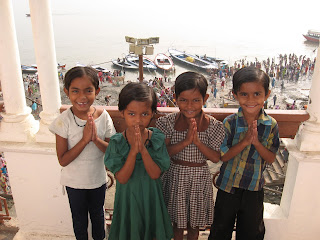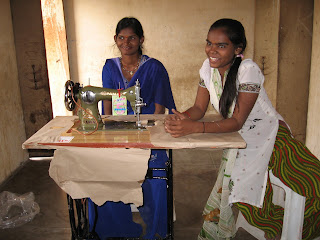
Welcome, readers! Three months into our internship at World Literacy of Canada's office in
Varanasi, we, the fourth generation of WLC CIDA interns, are starting to blog. We hope that this blog will serve to apprise friends and supporters of our lives and daily work here at the BBO (Banaras Branch Office).
I am this year's SEP (Social Enterprise Program) Intern. While in the final stages of my MA in English literature at the
University of Toronto, I became increasingly interested in the idea of abandoning my books, seeing another corner of the world, and gaining some life and work experience. I applied for the internship without ever really allowing myself to believe that I would be chosen for it, and when I was, I felt that I had no choice but to accept this obviously invaluable opportunity.

English literature, you may have observed, has little connection to Social Enterprise. World Literacy of Canada’s wonderful Social Enterprise Program aims to provide women with the training and resources to increase their financial independence through various kinds of business ventures. Though fascinated by and entirely supportive of the Social Enterprise Program, I was initially a little unsure of how I would be able to contribute to SEP with virtually no background in business. In practice, I have been visiting communities and meeting with beneficiaries in order to learn more about how the program operates. Recently, I have started conducting interviews with the recipients of loans which have enabled them to buy their own sewing machines. Meeting these women and observing their pride and eagerness at the prospect of earning more money for themselves and their families has been both humbling and enlightening. I am excited to conduct more such interviews (which will ultimately be converted into success stories to be read by WLC sponsors and supporters), and I feel really good about the way in which my SEP role has been molded to suit my interests and background.

In addition to my role with SEP, I have been working on various other writing projects, most of which are also aimed at supporters who want to learn more about the organization’s goings-on. Shortly after I arrived in Varanasi, I began work on a pamphlet of Emergency Fund success stories. WLC’s Emergency Fund is constituted by the donations of visitors to the India office. The BBO’s legal status precludes fundraising in India, so the only direct monetary donations that we give out are made possible by the generosity of our visitors. My role in this project has been to meet with recipients of emergency fund donations (mostly children, often victims of medical emergencies), and then write up short success stories about them for the pamphlet, which can then be given to visitors in order to show them the direct impact of their donations. As with those of the sewing machine loan recipients, these interviews have been tremendously eye-opening and educational, and I feel privileged to be conducting them.
Most recently, I have been working on a set of interviews that will eventually be included in the upcoming issue of Akshar, WLC’s annual magaz ine. These interviews were conducted at CDNVS, an NGO partner of WLC in Gorakhpur. All three interviews took the issue of women’s empowerment as their subject, and I was truly impressed by the insights of the interviewees. Listening to these women describe the ways in which their work and educational opportunities have afforded them a previously unimagined degree of confidence really brought home to me the connection between literacy and empowerment. There have been so many such moments in India when I have learned some fundamental truth in a way that would never be possible in the comfort of a Canadian classroom, and I am immensely grateful for each of them.
ine. These interviews were conducted at CDNVS, an NGO partner of WLC in Gorakhpur. All three interviews took the issue of women’s empowerment as their subject, and I was truly impressed by the insights of the interviewees. Listening to these women describe the ways in which their work and educational opportunities have afforded them a previously unimagined degree of confidence really brought home to me the connection between literacy and empowerment. There have been so many such moments in India when I have learned some fundamental truth in a way that would never be possible in the comfort of a Canadian classroom, and I am immensely grateful for each of them.
So that is more or less what I have been up to in the past three months. Here’s to another three months of delectable food, death-defying traffic, unforgettable sunrises, and new experiences.


 Indeed, many WLC programs are interconnected—often when one family member gets involved with one aspect of the organization, other family members will become interested in joining other programs. Today, for instance, I had the pleasure of encountering the mother of Pooja, one of my English students, at the Beauty Parlour in Tulsi Kunj. Maduri, Pooja’s mother, initially connected herself and her family to WLC by joining an ALC. Her three children are now all on WLC scholarships, and all three attend the Tulsi Kunj Tutorial Program daily. Now, Maduri is a student at Tulsi Kunj’s Beauty Parlour Program.
Indeed, many WLC programs are interconnected—often when one family member gets involved with one aspect of the organization, other family members will become interested in joining other programs. Today, for instance, I had the pleasure of encountering the mother of Pooja, one of my English students, at the Beauty Parlour in Tulsi Kunj. Maduri, Pooja’s mother, initially connected herself and her family to WLC by joining an ALC. Her three children are now all on WLC scholarships, and all three attend the Tulsi Kunj Tutorial Program daily. Now, Maduri is a student at Tulsi Kunj’s Beauty Parlour Program.

















